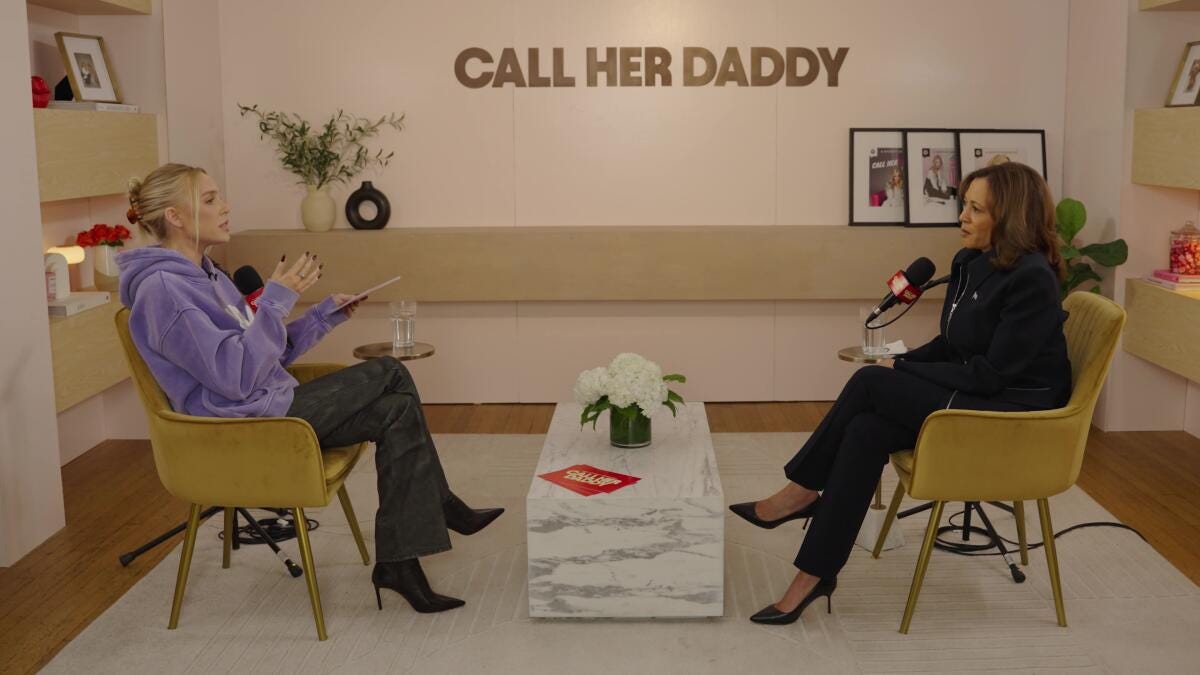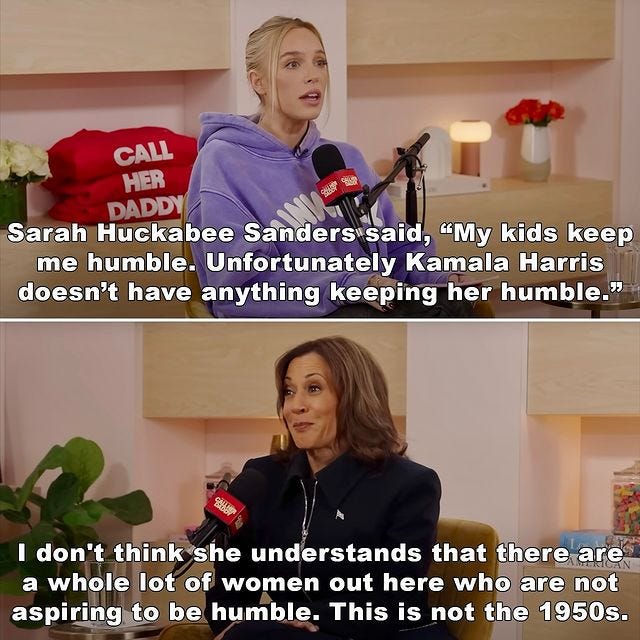“Kamala on Call Her Daddy is insane!” That was the temperature check I got when the episode was first announced. And as expected, Kamala Harris’s recent appearance on Alex Cooper’s Call Your Daddy has generated a lot of interest as the prospective leader of the free world enters the endgame phase of her campaign. Often criticized by both sides of the aisle for being too cautious with press and not giving enough interviews, Harris is combatting that in the home stretch of her truncated campaign with a slew of appearances intended to reach audiences that aren’t news junkies. Along with Call Her Daddy, Spotify’s most-listened to podcast by women, she’ll make stops this week at The View, The Late Show with Stephen Colbert and The Howard Stern Show. And while I expect the latter to be her most substantive sit-down, the Cooper interview, which aired on Sunday, is surely her most tactical.
“Wild to say, but the Call Her Daddy interview was the most meaningful I’ve heard from a politician ever,” read one tweet. “For once, women and women’s issues were centered. Domestic violence, child care, health care, abortion, economic freedom for women, all spoken in-depth and without interruption.” Meghan McCain, meanwhile, had “so many thoughts,” including wondering:
For me, I saw this as a big win for Kamala — but not as much for Cooper, despite this being a huge coup in terms of bookings.
Fully admitting that I am not the target demo here, as well as the fact that I’ve only listened to a handful of Alex Cooper’s podcast episodes (notably when she had RuPaul and Gwyneth Paltrow on), I came to this interview intrigued at how Harris would seize on the opportunity to have a conversation with someone who, at the top of the episode, told her “Daddy Gang” (her term for her fans):
“As you guys know, I do not usually discuss politics because I want Call Her Daddy to be a place where everyone feels comfortable tuning in.”
From that quote, I deduced the subtext: I have a large conservative fanbase, something Cooper admitted in her prelude to the interview. To that end, she reveals that she, not Harris, had been going back and forth for a while with whether to do this interview. Nothing has so clearly shown me the shift in both the media landscape and in political outreach than this admission.
Was it the kind of interview that a pop culture junkie might hope for with a steady stream of clippable moments? Not so. Cooper did a good job at asking the questions prepared on her notecards, but she let Harris run the interview. Whereas Katy Perry got asked “How were sex and relationships described to you growing up?” and Post Malone got grilled about his “poofy nipples,” Cooper never brought her whole self to this interview. Instead, she offered a more buttoned-up version of herself which, in effect, made her feel more like the guest than the host.
I found this interview incredibly well-played by Harris. In so many instances, politicians are trying to speak to the widest net of audiences (see: Harris’s speech at the DNC). This presented a rare opportunity to not only recognize but capitalize on what’s afforded when speaking to a targeted demographic. Rather than try and cover as much ground as possible in her 40 minutes, Cooper shrewdly reasoned that information on topics like the economy and border control were already out there — and, if we’re being honest, out of her depth. Knowing this, and knowing her audience, Cooper went deeper on the issues that most affect her audience of young women. She was able to do what many before her have failed to do, which is to keep the conversation substantive and not begin every question with “Trump says…”
If the interview will be remembered for anything, much like Walz ensnaring Vance with the question around whether Trump had lost the 2020 election during the VP debate, it’s an eleventh-hour quote from Harris when asked for her response to Governor Sarah Huckabee Sanders saying that her kids “keep her humble” and “unfortunately Kamala Harris doesn’t have anything keeping her humble.” Harris was able to showcase in her response one of her biggest strengths, and one, in my opinion, she’s not been afforded the opportunity to deploy enough: her sassiness. “I don’t think she understands that there are a whole lot of women out here who are not aspiring to be humble,” Harris breezily responded, then added: “This is not the 1950s.” It’s the kind of response — quippy, succinct, knife-twisting — that gets extracted and circulates on social media and could potentially even be used in political ads.
There were other strong moments for Harris. “I’m feeling great and I’m feeling nervous,” she said at the top of the episode when asked how she’s doing. I liked the honesty! She also acknowledged voter cynicism:
“I know that there’s a real feeling: ‘Well, what does it matter? Does my voice matter?’”
And I thought her words on child sexual assault, and the story about her best friend Wanda being sexually abused by her stepfather, was a particularly powerful segment. I also liked that she offered up practical advice for those enduring abuse.
“The first course of action is tell someone that you trust. Don’t quietly suffer. You have done nothing wrong. You have done nothing wrong and don’t let anyone convince you that you have. And know that there are people that want you to be safe and want to protect you. But don’t silently suffer. And know that you have a right to live in a place where you feel and are actually safe.”
But I wanted more moments of humanizing Harris, like when her husband, Doug, revealed that she loves Hacks or when she talked about one of her favorite albums of all time, Roy Ayers’s “Everybody Loves the Sunshine,” and, of course, her cooking tips.
While I appreciated the in-depth conversation around politics that directly affect many of the podcast’s listeners, I think there was a missed opportunity in allocating some time for questions that went beyond policy and felt more of the world of Call Her Daddy.
Still, I can appreciate Cooper for sticking her neck out here. While I don’t totally believe the legitimacy of some media outlets’ bend — “‘Call Her Daddy’ Faces Backlash Over ‘Propaganda’ Harris Interview” reads one headline — I do recognize that Cooper has an audience that likely includes many conservative listeners as well as many listeners who don’t want to hear about politics from either side of the aisle. Do I think the pros outweighed the cons for her? Certainly. But the cons are real. And like Taylor Swift before her, wading into politics when it’s not the thing you are known for can incite much vitriol, particularly of the misogynistic ilk.
Now, I say give the people what we really want and book Kamala on Very Delta.









Forget Delta, we want her on Shut Up Evan!